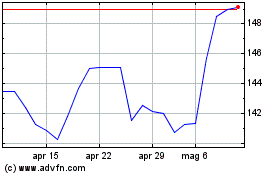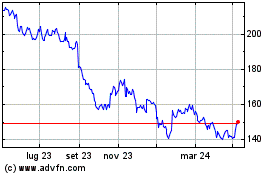The Other Havana Club Puts on a Play to Try to Sell More Rum
07 Aprile 2018 - 3:29PM
Dow Jones News
By Imani Moise
Bacardi Ltd.'s Havana Club rum is turning to immersive theater
to win over hearts and taste buds.
In its battle for recognition as an authentic Cuban rum, the
brand is staging a play, "Amparo," in a Midtown Manhattan bar,
following a debut in Miami last month.
The brand recruited a Cuban-American playwright and actors to
convince audiences at Bill's Townhouse that its version of the
spirit, made in Puerto Rico, should be considered the real Havana
Club. Another, more widely distributed, Havana Club is made in Cuba
and marketed by Pernod Ricard S.A. The two companies have long
feuded over the brand name and bragging rights.
During the course of the show, the audience is ushered in and
out of rooms as actors tell the story of the Arechabala family, who
founded Havana Club in 1934 but fled to Spain and then the U.S.
during the Cuban Revolution, and lost the company.
The audience follows characters as they run from gunshots and
confront Cuban militia members. Throughout the drama, actors pull
guests into the stories, grabbing their hands and rhetorically
asking: "What should I do? What would you do?"
"Amparo," which is the name of Ramon Arechabala's widow and
translates to "protection," opened as a limited engagement for the
press and social-media influencers. After the hourlong show, some
audiences members still confused Bacardi's Havana Club with
Pernod's.
The company plans to sell tickets for public performances in New
York City and Miami later this year.
Bacardi and Pernod Ricard have been sparring over naming rights
in the U.S. since 1994 when Bacardi bought the original recipe from
the Arechabala family.
Pernod declined to comment on the play.
If the desperate cries of actors aren't enough to win over the
audience, the free cocktails before, during and after the
performance might help.
Broadway producer Ken Davenport, who isn't involved with
"Amparo," said playwrights have used theater to spread political
and religious messages for centuries. For a corporation, "it's a
very smart and very subtle way to market their message," he
said.
Although uncommon, companies have a long history of using
theater to promote brands. Tabasco toured the U.S. in the late
1800s with an opera about its hot sauce. More recently, Stella
Artois has tapped Punchdrunk, the British theater company who
popularized immersive theater, to stage a play in London that
features its beer.
Immersive theater can be a particularly effective branding tool.
Emotional reactions are easier to elicit in interactive settings.
Several studies have found physical touch can be persuasive.
Immersion also can make products seem more appealing. A 2013
study published by BioMed Central Ltd. found multisensory
atmospheres have a significant impact on a person's enjoyment of an
alcoholic beverage.
One drawback of immersive theater for branding is that intimate
experiences can be hard to scale, said Chloë Rae Edmonson, a Ph.D.
candidate in CUNY's theater-studies program. "If you were in that
experience with 5,000 others it wouldn't be as effective."
Bacardi says it already has seen returns on the play through
increased engagement on social media and feedback from
customers.
"Of all the branded experiences I've been to, this one wasn't
too heavy handed," said Rachel Martino, a lifestyle blogger with
more than a quarter million followers on Instagram who attended the
preview. "Granted there was a lot of rum."
--Cara Lombardo contributed to this article.
(END) Dow Jones Newswires
April 07, 2018 09:14 ET (13:14 GMT)
Copyright (c) 2018 Dow Jones & Company, Inc.
Grafico Azioni Pernod Ricard (EU:RI)
Storico
Da Mar 2024 a Apr 2024

Grafico Azioni Pernod Ricard (EU:RI)
Storico
Da Apr 2023 a Apr 2024
